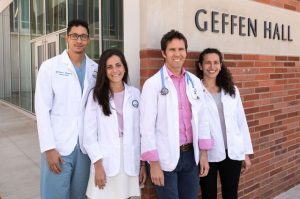UCLA will soon be able to probe the mysteries of all their medical data with the help of Microsoft’s mighty blue cloud capabilities. Their intention is to harness the AI analyzing powers of the Azure platform to process the vast amounts of research and clinical information and accelerate the discovery and development of treatments and enhance patient care.
Dr. Mohammed Mahbouba, chief data officer with UCLA Health Sciences, believes that machine learning is part of the natural evolution in healthcare. As electronic health records (EHR) become more widespread, the ability to digitally access the data contained within them means there is a demand for advanced computing capabilities to synthesize that information.
Enter Azure and their artificial intelligence capabilities. The UCLA-Microsoft cloud platform will draw data from various sources so that it can be analyzed in a holistic way. The hope is that the hospital will one day be able to personalize care to the individual. Mahbouba spoke about an UCLA initiative to develop an algorithm that identifies patients with conditions that are likely to deteriorate. He pointed to the possible benefits of being able to give caregivers a heads up for their patients at risk for heart disease or diabetes. If some of these factors can be mitigated, this may reduce rates of emergency room visits and hospitalization.
Predictive analysis has become an important branch of research. This has been done using structured data such as lab results and personal information but there is significant potential in unstructured data sources. Everything from genetic tests to radiological scans, and ultrasound readings, may be used to inform clinical decisions.
“Analyzing large data sets to make scientific discoveries is a race against time,” Mahbouba explained. “Using machine learning to analyze a combination of clinical and genomics data can provide critical insights, but doing so with a traditional computing infrastructure can require significant processing time. Azure enables us to quickly deploy and scale high-performance computing environments that can reduce the required processing time – sometimes from months to days – to make discoveries.”
Providing precision health – tailoring a patient’s treatment to the unique features of their medical condition and personal circumstances – is a priority for UCLA. The university launched their Institute for Precision Health in 2017, a multi-disciplinary project meant to make wide-reaching genomic and genetic research applicable for patient care.
“We are committed to creating better patient outcomes by providing UCLA Health with Microsoft Azure cloud and AI solutions to improve treatments and lives,” said Peter Lee, corporate vice president, Microsoft Healthcare. “By connecting health data and systems in the cloud in an interoperable way, we’re excited we can help advance health care data for more efficient and personalized care.”
Microsoft has established itself as a leader in the cloud-computing industry and enjoys a lion’s share of the enterprise market. They’ve made significant inroads into the life sciences sector and can count GE Healthcare, Mount Sinai’s Klein Lab, and City of Hope’s medical research and treatment among them.
The City of Hope, for example, uses advanced computing tools to learn more about diseases like cancer and diabetes. More specifically, their researchers use Linux-based Microsoft Azure virtual machines to run protein-modeling simulations faster than ever before. “We need more than one or two drugs to cure cancer; we need a whole palette of drugs in this new personalized medicine environment,” said Dr. Nagarajan Vaidehi, Director of Computational Therapeutics Core, City of Hope.
“By using…resources in Azure, we can run simulations in days that would take a month on CPU-based machines,” she added. “This speeds our progress towards the development of lifesaving drugs.”
Azure offers those resources to researchers when they need it in a cost-effective way.
























